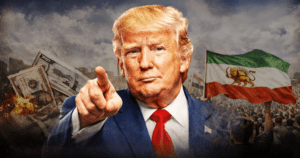Donald Trump is president again—and this time, the gloves are off.
In a flurry of executive orders and fiery speeches, Trump has reignited his long-standing pledge to remake America’s immigration system. But this isn’t just about “illegal aliens” or building new walls. It’s about redefining who belongs. Who gets to stay. And who, even after taking the oath, might be shown the door.
Now, with his eye set on ending birthright citizenship and targeting high-profile figures not born on U.S. soil, Trump’s deportation crusade has taken a darker, more personal turn.
Deporting Political Enemies: A Dangerous Fantasy?
Imagine this: Congresswoman Ilhan Omar, born in Somalia, naturalized in the United States after fleeing civil war, is suddenly at risk of being deported—because the president doesn’t like what she says on the House floor. Senator Ted Cruz, born in Calgary, Canada to a Cuban father and American mother, has his loyalty questioned—despite being a long-serving Republican—because he’s become a potential rival in the party. Elon Musk, born in South Africa, becomes a target for creating a new political movement—“The America Party”—that could peel off the libertarian-tech wing of the Republican base.
This isn’t a conspiracy theory—it’s the direction the narrative is heading.
Trump’s desire to wield immigration law as a political weapon is not new, but now it’s turbocharged by the machinery of power. His 2025 executive orders propose redefining “allegiance” in naturalization law, giving the Department of Homeland Security broader latitude to investigate and revoke citizenship in cases of “subversive activity”—a term yet to be defined clearly.
If you think this sounds unconstitutional, it is. But in a second Trump administration, that seems beside the point.
Birthright Citizenship in the Crosshairs
One of Trump’s first acts since returning to office was reviving his promise to end birthright citizenship—guaranteed by the Fourteenth Amendment. Under his proposal, children born to undocumented parents on U.S. soil would no longer be granted automatic citizenship. It’s a bold move that flies in the face of over a century of constitutional precedent.
Legal scholars across the spectrum agree: this is not within the executive’s power. Yet Trump insists he will test the boundaries of judicial restraint—and dares the Supreme Court to stop him.
But the implications are broader than the children of undocumented immigrants. If the government can start revoking or denying citizenship based on parentage, loyalty, or origin, then what prevents it from expanding the criteria further?
That’s why people like Elon Musk, now a political figure in his own right, are paying close attention. Musk, whose “America Party” launched just last month, has started to ruffle conservative feathers, particularly among Trump loyalists. A non-natural-born billionaire with his own ideological following? In today’s America, that’s not just a threat—it’s a target.
A Loyalty Test for Citizens?
While the U.S. Constitution clearly outlines who is a citizen and what rights they have, Trump’s recent comments suggest he sees loyalty not as a legal matter, but a personal one. Are you loyal to him? Are you speaking against his administration? Are you promoting values that he deems “un-American”?
Ilhan Omar, who has been the subject of relentless attacks from Trump for years, is again in the spotlight. His latest rally featured chants of “send her back” echoing across the crowd—a chilling repetition of 2019. Except this time, he’s not just campaigning. He’s governing.
Could he actually deport her? Legally, no—unless her naturalization was obtained fraudulently. But that hasn’t stopped his allies from pushing fringe theories about her citizenship process. Right-wing media has already floated the idea of “reinvestigating” Omar’s immigration file.
Even Ted Cruz—once a Trump challenger in 2016 and now seen as a potential rival again—has been caught in the storm. Trump has previously joked that Cruz’s Canadian birth is “suspicious” and raised questions about his presidential eligibility. While Cruz is a citizen by virtue of his American mother, he’s always existed in that grey space Trump loves to exploit: technically American, yet conveniently “foreign” enough to smear when politically expedient.
This kind of weaponization of the naturalization process is unprecedented—and terrifying. It sends a signal: political dissenters, especially immigrants and children of immigrants, are forever suspect.
Musk: Billionaire Citizen or Convenient Outsider?
Then there’s Elon Musk. Despite being one of America’s most influential entrepreneurs, he wasn’t born in the U.S.—a fact Trump has subtly leaned on while criticizing Musk’s new party. Trump recently called Musk “a guest in our country who should remember who welcomed him.”
That’s no casual remark. It implies conditional belonging. It reinforces the idea that even naturalized or long-time immigrant residents, no matter how successful, must remain politically compliant—or else.
Of course, Musk isn’t the kind to sit quietly. His political experiment threatens to draw young voters, independents, and even disgruntled conservatives away from the GOP. Which is precisely why Trump’s inner circle is looking for pressure points—including, allegedly, Musk’s immigration past and tax records.
Who’s Really Safe?
Let’s be clear: no president has the legal authority to revoke citizenship at will. The process is deliberate, rare, and reserved for extreme cases like terrorism or fraud. But the danger lies not just in what’s lawful—but in what’s threatened, attempted, and normalized.
If Trump can convince enough people that citizenship is conditional—that certain Americans are “less American” because of where they were born, what they say, or who they support—he doesn’t need to win every court case. The chilling effect alone is victory enough.
Imagine living in a country where a citizen lawmaker fears deportation for criticizing the president. Where a billionaire entrepreneur is painted as a foreign usurper. Where children born in American hospitals have their rights questioned based on their parents’ papers.
That’s not the America of laws—it’s the America of Trump.
Final Thought
Trump’s second presidency is proving to be more than a sequel—it’s a redefinition. His attacks on citizenship, naturalized Americans, and political rivals raise a troubling question: in this America, is anyone truly safe if they stand in his way?
The answer depends on how loudly the rest of us speak—and how fiercely we defend the Constitution before it becomes optional.













